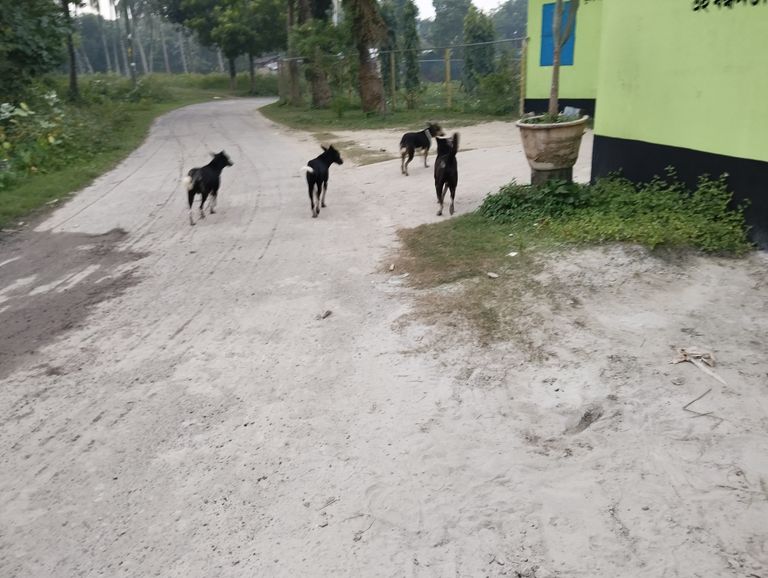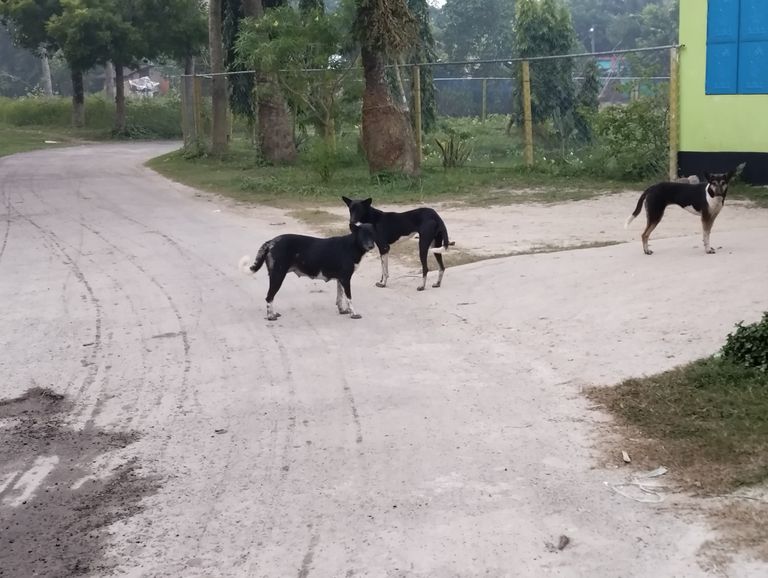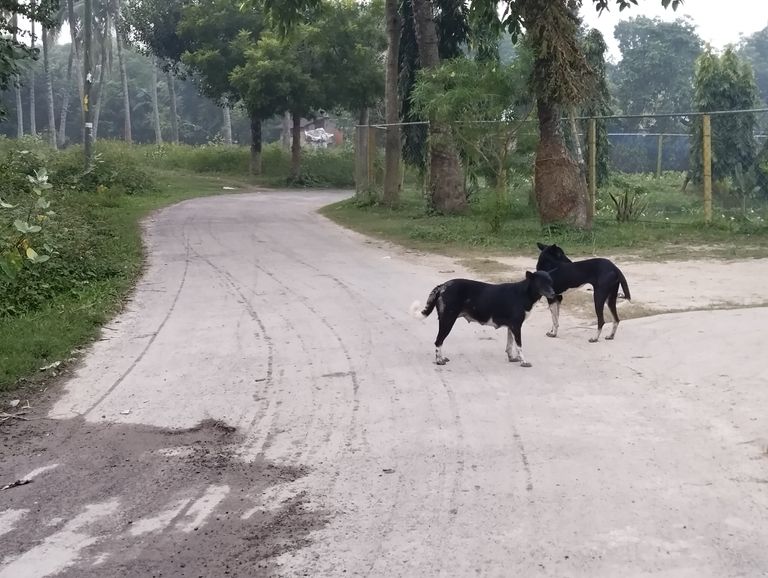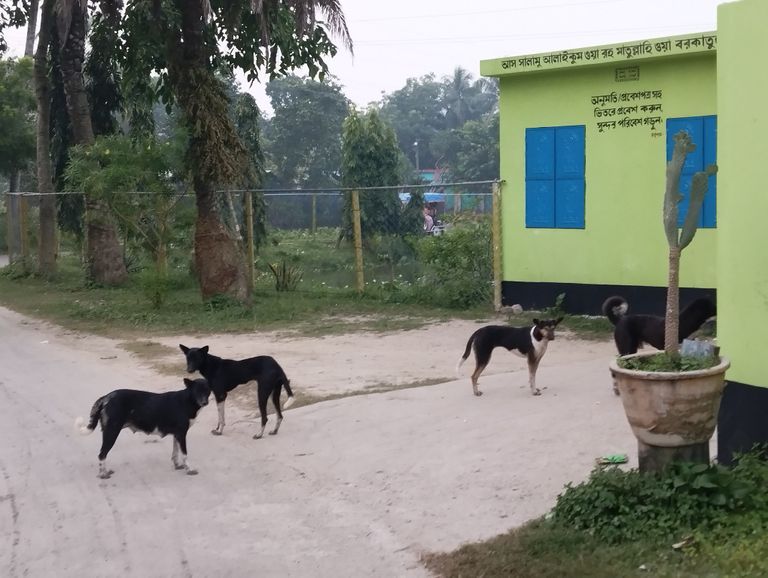
The Benefits of Raising Native Dogs Deshi Dogs.
Dogs have long been cherished as loyal companions to humans, offering protection, companionship, and emotional support. While many people are drawn to exotic or high-breed dogs, native dogs (commonly referred to as "Deshi Dogs" in South Asia) offer numerous advantages that often go overlooked. These dogs, indigenous to specific regions, have adapted to local climates, cultures, and lifestyles. In this blog, we’ll explore the many benefits of raising Deshi dogs, particularly in the context of Bangladesh and India, but also applicable to many other regions.
- Adaptability to Local Environment
One of the most significant benefits of raising native dogs is their natural adaptation to the local environment. Deshi dogs have evolved over centuries to thrive in the specific climate of their home region. In countries like Bangladesh and India, where temperatures can be extremely high, and conditions may vary between rural and urban settings, Deshi dogs have developed a resilience that imported breeds often lack.
For instance, high-breed dogs like Siberian Huskies or Saint Bernards, which originate from colder climates, struggle to cope with the heat and humidity of South Asia. They may require air-conditioned environments and special care to prevent heat strokes, which makes them less practical for average households. In contrast, Deshi dogs are naturally accustomed to the local weather, making them more low-maintenance and comfortable to care for in both rural and urban settings.
- Low Maintenance and Health Resilience
Deshi dogs are typically much easier to care for in terms of health and grooming. Their coats are suited to the local climate, meaning they don’t require frequent grooming or specialized care like many foreign breeds. In addition, these dogs are usually more resistant to common local diseases due to their genetic adaptation over generations.
In contrast, exotic breeds often require frequent visits to the vet for a wide array of health issues such as skin problems, respiratory conditions, and genetic diseases. Deshi dogs, on the other hand, generally have fewer hereditary health issues, and are naturally more robust, saving their owners from high veterinary costs and health complications.
- Cost-Effective
Another notable advantage of raising Deshi dogs is the cost-effectiveness. Acquiring a foreign breed can be expensive, with costs often running into the thousands for pedigree pups. Then, there are the ongoing costs of special food, grooming products, and medical care, which are often significantly higher for imported breeds.
In contrast, Deshi dogs can be adopted for little to no cost, often from local shelters or even directly from the streets. They do not require specialized diets or expensive treatments, making them far more affordable to raise. Their low-maintenance nature also means owners spend less on grooming and healthcare, which can add up to substantial savings over time.
- High Intelligence and Trainability
Many people mistakenly believe that foreign breeds are inherently more intelligent or easier to train than native dogs. However, Deshi dogs are highly intelligent and responsive to training. In fact, their natural street-smart tendencies make them incredibly resourceful and quick learners.
Deshi dogs often display heightened survival instincts, making them excellent guard dogs or companions in various living conditions. They are known to be alert and protective, characteristics that can be enhanced with proper training. With the right guidance, a Deshi dog can become just as loyal, obedient, and skilled as any high-breed dog.
- Promoting Ethical Pet Ownership
By choosing to raise a Deshi dog, you are also contributing to more ethical pet ownership practices. The growing demand for exotic breeds has led to the rise of unethical breeding practices, often carried out in puppy mills where animals are mistreated and overbred for profit. These practices have resulted in severe health problems and the unethical treatment of many animals.
In contrast, adopting a Deshi dog, especially from a shelter or rescuing a stray, helps address the issue of stray dog overpopulation in many regions. In countries like Bangladesh and India, stray dogs are often neglected or treated poorly, and by giving one a home, you are directly contributing to animal welfare. Adopting a native dog rather than purchasing an exotic breed also helps reduce the demand for inhumane breeding practices.
- Loyalty and Companionship
Deshi dogs are known for their loyalty and strong bonds with their owners. Since many of these dogs have grown up in challenging environments, they tend to form deep emotional connections with their caregivers when given a stable and loving home. This makes them extremely loyal companions who are often protective of their families.
Their loyalty also extends to their protective instincts. Deshi dogs make excellent watchdogs, as they are naturally alert and territorial. Their bond with their owners and their sharp instincts make them reliable protectors of the home, often without the need for specialized guard dog training.
- Contributing to Biodiversity and Conservation
Raising a Deshi dog also contributes to preserving the biodiversity of dog breeds. In an age where globalization has led to the homogenization of pet ownership, many indigenous breeds are at risk of becoming endangered or extinct. By choosing to adopt or raise a Deshi dog, you are helping preserve the genetic diversity of canine breeds, which is essential for the overall health and sustainability of the dog population.
Additionally, native dog breeds are often better suited to the local ecosystem and can contribute to the balance of nature in their regions. These dogs have been part of the cultural and environmental landscape for centuries, and raising them helps maintain that balance.
- Versatility in Various Lifestyles
Deshi dogs are incredibly versatile and can adapt to a variety of living conditions. Whether you live in a bustling city, a small town, or a rural village, a native dog can adjust to your lifestyle. They are equally comfortable in an apartment as they are in a house with a yard, as long as they receive adequate exercise and attention.
Many foreign breeds, in contrast, require specific environments to thrive. Large dogs like Great Danes or German Shepherds need ample space and may struggle in smaller living spaces, while certain small breeds may not fare well in rural settings where they might encounter rough terrain or other animals. Deshi dogs, on the other hand, are known for their adaptability and can thrive in a wide range of environments.
- Lower Risk of Inbreeding
In many regions, especially with exotic breeds, inbreeding is a common practice to maintain certain desirable traits. This can lead to severe genetic issues and health complications in the dogs. Native breeds, however, have a wider genetic pool, reducing the risk of inbreeding and its associated problems. This genetic diversity makes Deshi dogs generally healthier and more robust compared to their high-breed counterparts.
Conclusion
Raising a Deshi dog offers a multitude of benefits, from their adaptability to the local climate to their low-maintenance nature and cost-effectiveness. These dogs are intelligent, loyal, and make excellent companions, whether you're living in an urban apartment or a rural homestead. By adopting a native breed, you also contribute to ethical pet ownership and help preserve the biodiversity of dog breeds in your region.
In a world where foreign breeds often get more attention, it’s time to recognize the value of Deshi dogs. They are a testament to the resilience, loyalty, and intelligence of indigenous animals and can bring immense joy and companionship to their owners. Whether you’re an experienced pet owner or someone considering a dog for the first time, a Deshi dog could be the perfect choice for your household.


All You Need to Know About Dog Vaccines: A Comprehensive Guide
Vaccinating your dog is one of the most important responsibilities you have as a pet owner. Vaccines protect your dog from various life-threatening diseases, many of which are highly contagious and can spread not only among other pets but even to humans in some cases. This guide will walk you through everything you need to know about dog vaccines, helping you ensure your furry companion stays healthy and safe.
What Are Vaccines, and Why Are They Important for Dogs?
A vaccine is a biological preparation that provides immunity to a specific disease. It contains an agent that resembles the disease-causing organism but is either killed or weakened, so it doesn’t cause the illness. When administered, it stimulates the dog's immune system to recognize the agent as a threat and create antibodies to fight it off in the future. This way, if the dog is exposed to the disease later, their body is already equipped to respond more effectively and prevent illness.
Vaccination is crucial because:
- Prevents deadly diseases: Many diseases that affect dogs, such as rabies and parvovirus, are fatal or have severe consequences if not treated early.
- Reduces disease spread: Vaccinated dogs are less likely to transmit infectious diseases to other dogs, animals, or even humans.
- Helps achieve herd immunity: If a large percentage of a dog population is vaccinated, the spread of disease is reduced, protecting even those dogs who cannot be vaccinated due to medical reasons.
- Cost-effective: Treating diseases can be much more expensive than preventing them. Vaccines are a safe and cost-effective way to keep your dog healthy.
Core Vaccines for Dogs
Core vaccines are considered essential for all dogs, regardless of their location or lifestyle. These vaccines protect against diseases that are highly contagious and/or pose a severe risk to dogs and humans. The core vaccines for dogs typically include:
- Rabies
What it is: Rabies is a viral disease that affects the central nervous system. It can be transmitted to humans and is almost always fatal once symptoms appear.
Why it's important: Vaccination is mandatory in most places due to the public health risk.
Schedule: The rabies vaccine is usually given at 12–16 weeks of age and followed by a booster after one year. After that, it’s given every one to three years, depending on local regulations and the vaccine used.
- Canine Distemper
What it is: Canine distemper is a highly contagious virus that affects a dog's respiratory, gastrointestinal, and nervous systems.
Why it's important: It’s often fatal and has no cure, but it is preventable with a vaccine.
Schedule: Puppies typically receive this vaccine at 6–8 weeks, with boosters every 3–4 weeks until 16–20 weeks of age, and then another booster after one year.
- Canine Parvovirus
What it is: Parvovirus is a highly contagious virus that causes severe gastrointestinal symptoms like vomiting and diarrhea. It is often fatal, especially in puppies.
Why it's important: Parvovirus is widespread and highly resistant to environmental factors, meaning it can live in the environment for long periods.
Schedule: The vaccine schedule is similar to that of distemper, with initial shots starting at 6–8 weeks and followed by boosters.
- Canine Adenovirus (Hepatitis)
What it is: Canine adenovirus type 1 causes infectious hepatitis, affecting the liver, kidneys, and other organs.
Why it's important: The disease can be fatal, but the vaccine is very effective in preventing it.
Schedule: Like distemper and parvovirus, this vaccine is given to puppies at around 6–8 weeks with a series of boosters.
Non-Core Vaccines for Dogs
Non-core vaccines are recommended based on a dog's lifestyle, geographical location, and risk of exposure. These vaccines protect against diseases that are either less common or pose less severe health risks. Some of the common non-core vaccines include:
- Leptospirosis
What it is: Leptospirosis is a bacterial disease that can affect both dogs and humans. It is typically spread through contaminated water or soil.
Why it's important: Dogs that spend a lot of time outdoors, especially near water sources, are at a higher risk of contracting this disease.
Schedule: The vaccine is typically given to at-risk dogs starting at 12 weeks of age, followed by a booster in 2–4 weeks and annual boosters thereafter.
- Lyme Disease
What it is: Lyme disease is caused by a bacteria transmitted through tick bites. It can lead to joint pain, fever, and even kidney failure in severe cases.
Why it's important: Dogs in areas where ticks are common should be vaccinated, especially if they spend time in grassy or wooded areas.
Schedule: The Lyme vaccine is usually given at 12 weeks, followed by a booster in 2–4 weeks, and then annually.
- Bordetella (Kennel Cough)
What it is: Bordetella bronchiseptica is one of the primary causes of kennel cough, a highly contagious respiratory infection.
Why it's important: Dogs that frequently interact with other dogs in kennels, dog parks, or grooming facilities are at a higher risk of contracting kennel cough.
Schedule: The vaccine can be administered either as an injection or nasal spray and is typically given annually, though more frequent boosters may be needed in high-risk environments.
- Canine Influenza
What it is: Canine influenza is a contagious respiratory disease in dogs caused by specific strains of the influenza virus.
Why it's important: Outbreaks are often reported in areas with high concentrations of dogs, such as kennels, shelters, or dog parks.
Schedule: The vaccine is usually administered in two doses, 2–4 weeks apart, followed by an annual booster.
When Should Dogs Be Vaccinated?
The vaccination schedule for dogs depends on their age, health status, and risk factors. Puppies, in particular, require a series of vaccinations to ensure they are fully protected as their immune systems develop. Here’s a general timeline:
6–8 weeks: First set of core vaccines, including distemper, parvovirus, and adenovirus.
10–12 weeks: Second round of core vaccines and non-core vaccines, such as leptospirosis or Bordetella, depending on risk factors.
14–16 weeks: Third set of core vaccines, and possibly rabies, depending on local regulations.
1 year: Booster shots for core vaccines and any non-core vaccines, if necessary.
Annual/Triennial: After the first year, core vaccines may be given every 1–3 years, depending on the vaccine. Non-core vaccines are usually given annually if the dog is at risk.
Are Vaccines Safe for Dogs?
Vaccines are generally safe for most dogs, but like any medical treatment, they may have some side effects. Common side effects are usually mild and short-lived, such as:
Slight fever
Soreness or swelling at the injection site
Decreased appetite or energy levels for a day or two
In rare cases, more serious reactions can occur, such as allergic reactions, which may include vomiting, diarrhea, difficulty breathing, or facial swelling. If your dog exhibits any of these symptoms, it’s essential to contact your veterinarian immediately.
Some dogs with specific health issues or those that are very old may not be ideal candidates for certain vaccines. In such cases, a veterinarian can help assess the risks and determine the best course of action.
The Importance of Veterinary Guidance
While it’s essential to be informed about the different types of vaccines available for your dog, it’s equally important to consult with your veterinarian to develop a tailored vaccination plan. Not every dog requires every vaccine, and factors such as age, lifestyle, and geographic location play a significant role in determining which vaccines are necessary.
Your vet will assess your dog's overall health and risk of exposure to specific diseases before recommending the appropriate vaccines. They will also ensure that vaccines are administered on time and boosters are given as needed.
Conclusion
Vaccines are a critical part of your dog’s preventive healthcare routine. They protect your pet from a range of dangerous diseases, some of which can be transmitted to humans, and contribute to the overall health and well-being of the canine community. By staying informed and working closely with your veterinarian, you can ensure that your dog remains happy, healthy, and protected from preventable diseases.


Congratulations, your post has been upvoted by @dsc-r2cornell, which is the curating account for @R2cornell's Discord Community.
Enhorabuena, su "post" ha sido "up-voted" por @dsc-r2cornell, que es la "cuenta curating" de la Comunidad de la Discordia de @R2cornell.